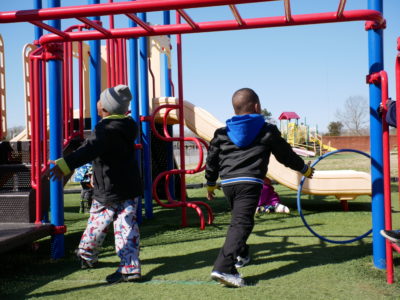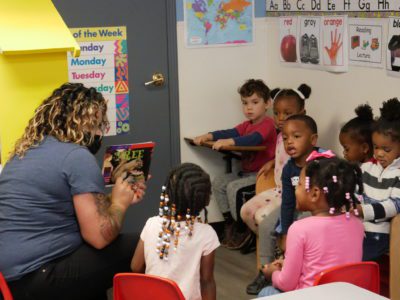
|
|
An annual report on state-funded preschool programs has found a significant increase in NC Pre-K enrollment after the COVID-19 pandemic erased a decade of progress.
But that increase in enrollment did not correspond to an increase in funding per child, when adjusted for inflation.
The National Institute for Early Education Research (NIEER) has published its State of Preschool report annually for 20 years. The newest edition relies on data from the 2021-2022 school year.
According to the report for North Carolina, 23,679 4-year-olds were enrolled in NC Pre-K — North Carolina’s state-funded preschool program — in 2022. That’s a 19% increase over the previous year.
But enrollment is still 5% lower than its peak in 2019-2020, before the impact of the pandemic. And children enrolled in NC Pre-K represent less than one in five of the state’s 4-year-olds.
Per-child spending in the state was down 27% from the previous year, when adjusted for inflation — to $7,357 in 2021-2022 from the equivalent of $10,071 in 2020-2021.
The authors of the report say this spending amount “remains well below what is required to fund a full-day preschool program of the quality required to meet the needs of young children for learning and development.”
How North Carolina compares with the nation
Nationwide, state-funded preschool enrollment increased by 13%, but remains 8% below pre-pandemic levels. Per-child spending has been stagnant for two decades while overall enrollment has increased.
Here are some other national findings from the report:
- Forty-four states, Washington, D.C., and Guam provide publicly funded preschool to almost 1.53 million children.
- Nine states served more than half of 4-year-olds; only D.C. served more than half of 3-year-olds.
- States spent $9.9 billion on pre-K in 2021-2022, including $393 million in federal COVID-19 relief funds.
- Five states met all 10 quality standards benchmarks; nine states met fewer than half.
- Six states still fund no pre-K program at all.
North Carolina ranks 30th in enrollment of 4-year-olds, down from 26th in the last two reports. It’s one of only 15 states not providing state-funded preschool access to 3-year-olds.
The state ranks 13th in both state spending per child and overall spending per child. Overall spending includes state funds, plus the state’s portion of federal funding for Head Start and special education.
North Carolina meets eight of NIEER’s 10 quality indicators, unchanged from the previous report. The two indicators that the state fails to meet are both related to teacher qualifications. This is a nationwide concern for the authors of the report:
Most state-funded preschool programs reported experiencing a shortage of qualified teachers during the 2021-2022 school year, including North Carolina, but few states reported providing incentives for teacher recruitment or retention. Waivers to teacher education requirements were more prevalent than in previous years, raising concerns about preschool quality.
“North Carolina leaders must address this ongoing lack of access and related issues of teacher retention and pay to ensure that all children have access to the educational opportunities they deserve,” Allison Friedman-Krauss, the report’s lead author, said in a press release.
Despite the discrepancy between enrollment and funding, and concerns about quality and compensation, NIEER’s senior co-director, Steven Barnett, sees reason for hope.
“There are seven states that recently committed to preschool for all,” Barnett said during a media call. “These include California, Colorado, Hawaii, New Mexico, Illinois, Michigan, and New Jersey. Together these states have almost a quarter of all young children in the United States.”
This list does not include North Carolina.
“North Carolina should assess its support for preschool against neighbors and other states that provide stronger early learning opportunities,” Barnett said in the press release. “North Carolina’s young children deserve no less than others.”





